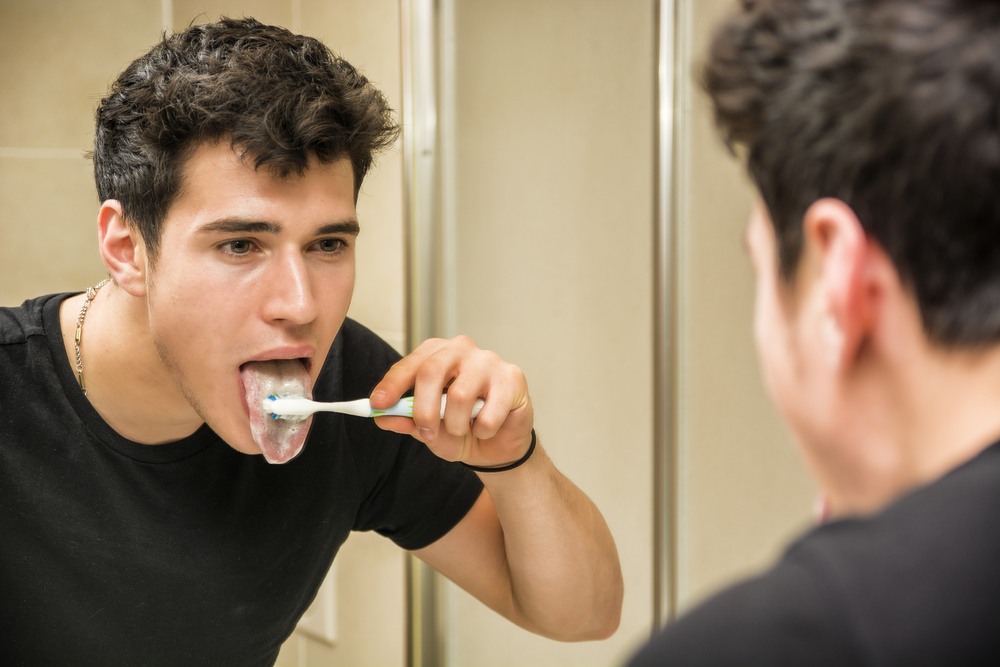
You brush your teeth twice daily, religiously floss, and use mouthwash, yet something still isn’t right.
Maybe you’ve noticed bad breath that won’t go away, or an odd film coating your tongue. While it might not be obvious, the culprit is often hiding in plain sight.
The small bumps covering its surface are called papillae, and they create the perfect hiding spots for food particles, dead cells, and harmful bacteria. When you don’t keep up with cleaning your tongue, this buildup can cause serious problems that go far beyond embarrassing breath.
TL;DR
Brushing and flossing aren’t enough—your tongue holds bacteria that can cause bad breath, cavities, and gum issues. Learn why daily tongue cleaning matters, what tools to use, and how to do it right.
Main Points:
- Bacteria hide in tongue papillae, causing odor and oral issues
- Tongue cleaning helps prevent bad breath, gum disease, and cavities
- Use a toothbrush, tongue scraper, or mouthwash
- Scraping is more effective than brushing for odor control
- Clean your tongue after brushing, before rinsing
- Ease gag reflex by starting slowly or cleaning at night
- For infants, use a soft cloth or finger brush
- Watch for changes in tongue color or texture
Why Your Tongue Needs Daily Attention
Think of your tongue as a shag carpet. All those papillae create countless crevices where debris accumulates, producing volatile sulfur compounds, the same chemicals responsible for that rotten egg smell.
To make things even worse, bacteria from your tongue can redeposit onto your freshly cleaned teeth and gums, ruining your careful brushing and flossing efforts.
Neglecting tongue hygiene contributes to gum disease, persistent bad breath, and even cavities. A white coating on the tongue surface is often your first warning sign that bacteria levels have gotten out of control.
The Right Tools for the Job
Learning how to clean your tongue doesn’t require expensive equipment or complicated techniques. You can choose from three main options, each with specific advantages. Your regular toothbrush works well in a pinch for tongue cleaning.
The soft bristles can dislodge some bacteria and debris. Many people like this method because it’s convenient, since you’re already holding your toothbrush anyway when brushing your teeth.
Tongue scrapers, however, are the most effective means of cleaning your tongue. These tools are simple, inexpensive, and specifically designed to remove the thin layer of mucus and bacteria coating your tongue’s surface. Research suggests they’re more effective than toothbrushes at reducing the sulfur compounds that cause bad breath.
Mouthwash designed with mouth pH and the oral microbiome in mind is also an excellent complement to mechanical cleaning. While it can’t replace brushing or scraping, it helps reach areas your tools might miss.
Step-by-Step Tongue Cleaning Techniques
When you’re ready to learn how to brush your tongue, timing matters. You’ll need to clean your tongue after brushing your teeth, but before your final rinse. This way, you’ll benefit from any remaining toothpaste while ensuring a thorough clean.
If you’re using a toothbrush, extend your tongue as far as is comfortable for you and position the brush at the back of your tongue, and gently brush forward using a little bit of pressure. Cover the entire surface area, spending 15-30 seconds on this process. Don’t forget the sides and tip of your tongue.
If you’re wondering how to use a tongue brush or scraper, the technique is easy. Place the tool at the back of your tongue and pull it forward with steady, gentle pressure. Rinse the scraper after each pass and repeat several times at different angles. The goal isn’t to aggressively scrub, but gentle, consistent pressure works best.
Things to Keep in Mind
That gag reflex can make tongue cleaning challenging for some people. If that’s true for you, start by cleaning the middle portion of your tongue first, gradually working your way back as you become more comfortable. Evening cleaning might be easier than morning sessions since our gag reflexes tend to be more sensitive in the morning.
Parents often ask about how to clean a baby’s tongue. For infants, you can use a soft, damp cloth or a finger brush designed for babies. Gently wipe the tongue’s surface after feedings. As your children grow older, you can introduce a soft-bristled toothbrush specifically designed for their age group.
How to Clean Your Tongue: FAQs
How do you get rid of buildup on your tongue?
You can use a tongue scraper or soft toothbrush to gently remove the bacterial film coating your tongue. Clean from the back of your tongue to the front with light pressure, rinsing your tool after each pass. To achieve the best results, combine this with mouthwash.
How do you deep clean your tongue?
For the best possible cleaning, use a tongue scraper after brushing but before your final rinse, making multiple passes at different angles, covering the entire tongue surface.
Is a tongue brush or a tongue scraper better for cleaning your tongue?
Studies show tongue scrapers are more effective, removing 75% of odor-causing compounds compared to 45% with toothbrushes.
At SuperMouth, we think it’s incredibly important to understand the connection between your tongue and overall health. Cleaning you tongue with a high-quality tongue scraper is not only good for your breath but your oral health as well.
Final Thoughts
Pay attention to unusual changes in your tongue’s appearance or texture. White patches, persistent soreness, unusual colors, or lumps that don’t resolve within a few weeks warrant a dental or medical evaluation.
Your tongue’s health reflects your overall oral hygiene status. By incorporating proper tongue cleaning into your daily routine, you’re taking a simple yet powerful step toward fresher breath, reduced cavity risk, and optimal oral health. Don’t let the dirtiest part of your mouth sabotage your smile any longer.
Shop tongue scrapers and cleaners at SuperMouth now! Designed by Dr. Kami Hoss, SuperMouth offers oral care products for all ages. Start improving your routine with the right products.

